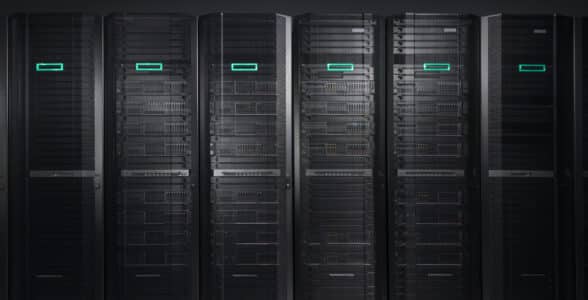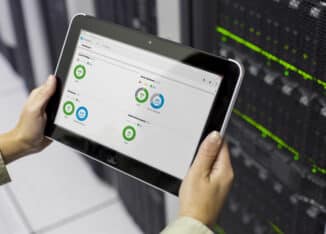
Gemma Skelley
Head of Marketing
September 15, 2025
In an age where data is growing at breakneck speed and complex problems demand equally complex solutions, supercomputers stand out as the titans of modern computing. But what are supercomputers exactly? Put simply, they are ultra-high-performance machines designed to process massive volumes of data and perform calculations at speeds no ordinary computer can match.
Unlike the laptop on your desk or the server in a standard data centre, supercomputers operate at the edge of what’s computationally possible. They’re built to tackle the kind of workloads that involve climate modelling, genome sequencing, and even simulating black holes. When someone asks, “what is a super computer?”, the real answer lies not just in raw speed, but in their ability to drive innovation across science, medicine, defence, and more.
What Are Supercomputers?
Supercomputers are purpose-built systems that consist of thousands, sometimes even millions, of processing cores working together in parallel. Their performance is measured in FLOPS (floating-point operations per second), with today’s top machines achieving quadrillions or even quintillions of operations every second. These machines aren’t used for spreadsheets or web browsing. They exist to solve problems that are too large, too complex, or too time-sensitive for any other kind of system.
Key Characteristics of Supercomputers
-
Processing Power
Supercomputers are defined by their raw computational speed. With thousands of high-performance CPUs and GPUs operating simultaneously, these systems are designed for parallel processing on a massive scale.
Massive Storage & Memory
These machines rely on huge memory reserves and fast storage systems to access, manipulate, and analyse vast datasets. Without this, even the fastest processors couldn’t keep up with the demands of supercomputing workloads.
-
Specialised Cooling Systems
All that processing power generates intense heat. Supercomputers use advanced cooling systems (like liquid cooling or immersion cooling) to stay operational and avoid performance drops due to thermal stress.
Energy Consumption
Supercomputers are energy-hungry. Operating a top-tier system can consume megawatts of power, making energy efficiency and sustainability important considerations in modern supercomputer design.
Uses of Supercomputers
-
Weather forecasting & climate modelling
Supercomputers help simulate global weather systems and model long-term climate trends. They provide the computational accuracy required to predict hurricanes, droughts, and shifts in climate patterns.
Medical research & drug discovery
They’re instrumental in mapping genomes, modelling molecular interactions, and accelerating drug development. This helps medical researchers cut time and cost in life-saving discoveries.
-
Artificial intelligence & machine learning
From training large language models to developing advanced algorithms, supercomputers power the next generation of AI innovation. They enable experimentation and scale that standard systems can’t match.
National defence & cryptography
Supercomputers play a key role in national security, from modelling weapons systems to cracking or protecting encrypted data. Their speed enables real-time analysis of defence scenarios.
-
Space exploration
NASA and other space agencies use supercomputers to simulate planetary systems, plan trajectories, and interpret astronomical data that shapes our understanding of the universe.
Advantages of Supercomputers
Speed and Efficiency
Supercomputers drastically reduce the time it takes to run complex computations from weeks to hours. This opens up new possibilities in time-sensitive research and decision-making.
Ability to handle vast datasets
Their architecture is built to manage large-scale, high-resolution datasets that would overwhelm ordinary systems, making them essential for data-intensive fields like genomics or climate science.
Driving scientific breakthroughs
Supercomputers make the previously impossible achievable. From decoding the human genome to simulating entire galaxies. They serve as a launchpad for major discoveries across disciplines.
Disadvantages of Supercomputers
-
Extremely high costs
Building and operating a supercomputer is a significant investment. The hardware, cooling, staffing, and energy needs quickly add up, limiting their use to governments and large institutions.
Large energy requirements
Power consumption is a major issue; not just for operation, but also for cooling. Energy efficiency is improving, but sustainability remains a challenge for the industry.
-
Maintenance challenges
These machines are complex and require constant upkeep. Skilled technicians and specialised engineers are essential to keep systems running smoothly.
Not suited for everyday use
Supercomputers are overkill for routine tasks. Their purpose is highly specialised, making them inaccessible and impractical for general consumer or business use.
Facts About Supercomputers
Here are some interesting facts about supercomputers that highlight how far this technology has come (or is still going):
-
The world’s fastest supercomputers now reach exaflop performance (over one quintillion FLOPS).
-
Many of the leading systems are used not just for science but increasingly for AI, weather forecasting, and other “real‑world” applications.
-
There are relatively few exascale systems globally; many supercomputers are still in petascale tier.
-
A modern smartphone has far less RAM, storage, and processing power than even modest supercomputers of a decade ago.
-
Some supercomputers are sited in remote or unusual locations (e.g. underground, cooled using natural water sources) to make cooling or power supply more efficient.
-
The “Alps” supercomputer in Switzerland runs at ~ 435 petaflops, consumes ~ 7 megawatts, and uses its waste heat for city heating. Wikipedia
-
The “Jupiter Booster” in Germany (EuroHPC) is modular, designed for AI training, climate modelling, etc., and its speed is in the hundreds of petaflops.

The Future of Supercomputers
We’re entering a turning point in computing history. As the world generates more data than ever before, from scientific instruments to social media, the pressure is on to process it quickly, intelligently, and responsibly. That’s where supercomputers step in.
Exascale computing, once considered futuristic, is now a reality. These machines can perform more than a quintillion calculations per second, and we’re already looking beyond them. The next leap? Zettascale computing, AI-optimised architectures, and supercomputers that integrate seamlessly with the cloud. Imagine having on-demand access to immense computational power without owning the hardware.
The future is faster and smarter. Supercomputers will be central to tackling the big questions: how to respond to climate emergencies, how to prepare for future pandemics, how to design cities that are both liveable and sustainable. As quantum computing continues to develop, we could see hybrid systems emerge, fusing the brute force of classical supercomputing with the problem-solving elegance of quantum logic.
In short, supercomputers will help shape the future.
Key Takeaways
Supercomputers aren’t science fiction, they’re the real-world engines behind some of humanity’s greatest discoveries. From decoding DNA to predicting hurricanes, they help us understand the world in ways we couldn’t before.







